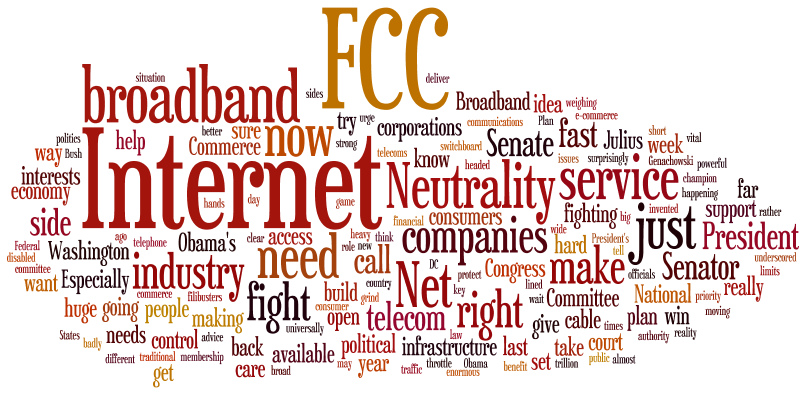
Chances are that if you’re reading this you already know what net neutrality is. In very simple terms it means that bandwidth providers cannot provide paid “fast lanes” or otherwise prioritize Web traffic or speed to select customers. Say, for example, you’re a startup with an online media focus. Without net neutrality a huge company like Netflix or ShowBox could pay for faster speeds, placing you at a massive disadvantage.
The Internet Giants Weigh In
A group of Internet companies over 100 strong collaborated on a letter to Tom Wheeler, chairman of the Federal Communications Commission (FCC). Wheeler is the architect of proposed changes to FCC standards that would create the exact sort of “fast-lane” issues noted above. Among the signatories of the letter were household names including Amazon, Dropbox, Ebay, Etsy, Facebook, Foursquare, Google, LinkedIn, Microsoft, Netflix, Reddit, Tumblr, Twitter, and Yahoo, as well as numerous Internet startups.
They lay out in no uncertain terms the danger to business if Wheeler’s proposals are implemented. The stifling of innovation is merely one argument against Wheeler’s vision of the Internet.
Time magazine brings us the following on the subject:
Wheeler’s new proposal would allow broadband providers to strike special deals with Internet companies for preferential treatment — sometimes called ‘paid prioritization’ — in the ‘last mile’ to consumers’ homes. Open Internet advocates have long considered such Internet ‘fast lanes’ to be anathema to net neutrality principles because they would give deep-pocketed companies an advantage over startups.
‘According to recent news reports, the Commission intends to propose rules that would enable phone and cable Internet service providers to discriminate both technically and financially against Internet companies and to impose new tolls on them,’ the tech companies wrote in their letter. ‘If these reports are correct, this represents a grave threat to the Internet.’
But Where Is Apple?
One big name was conspicuous by its absence from the letter: Apple. You would think that a company whose current model involves a lot of data transfer (iTunes, iCloud, iPhones, etc.) would be quick to sign on with such an effort. Of course the abandonment of net neutrality would be a huge net gain for telecoms and therein might be an explanation.
The Wall Street Journal Blog takes note of one pertinent detail:
One possible explanation: The Journal reported in March that Apple and Comcast, who agreed to acquire Time Warner Cable for $45 billion in a deal that has raised concerns for net neutrality backers, are in talks for a streaming-television service that would use an Apple set-top box and get special treatment on Comcast’s cables to ensure it bypasses congestion on the Web.
Internal Revolt at the FCC
The outcry against this plan has even caused a break in the usually cohesive ranks of the FCC. Commissioner Jessica Rosenworcel said in a speech that she has “real concerns” about the current plan. She also called for a delay of next week’s crucial agency vote on the matter. As of this writing the vote remains on the agency’s schedule for May 15.
At nearly the same time another FCC commissioner, Mignon Clyburn, said the agency should take a “fresh look and evaluate our policy in light of the many developments that have occurred over the last four years.” While the language is mild the mere fact these disagreements are now being aired from within ranks speaks volumes.
And then there were three: “I have grave concerns about the chairman’s proposal on Internet regulation and do not believe that it should be considered at the commission’s May meeting,” said FCC Commissioner Ajit Pai in a short statement. He urged the commission to spend its time during the May meeting focusing on the upcoming spectrum auction.
Why Should I Worry?
If your brand is a smaller one, or a startup, there is the prospect of being unable to meet the financial standard set by the giants in your field. A fledgling company in video communications would be on a far more uneven playing field should larger firms with deep pockets — Skype or OoVoo, for instance — be able to pay for priority bandwidth. Since most of the Internet giants of today were originally tiny startups, it is easy to see how important innovation and an open Internet have already proved to be.
The Daily Beast offers us a hypothetical young entrepreneur a few years in the future. As he develops a video startup he runs up against the barriers set before him by Wheeler’s plans becoming law:
There’s just one problem: after months of design and testing — and a bit of angel funding from contacts he met along the way — the young man learns that to deliver his product to customers at fast speeds, and compete with the ‘big boys,’ the multi-billion dollar firms already in his field, he’ll have to pay Comcast or Verizon an exorbitant fee. His video service uses a lot of bandwidth, and, years before, in 2014, the Federal Communications Commission began allowing cable companies to charge startups like his more for the bandwidth they use. The cable companies call it a ‘fast lane,’ but in reality it’s a barrier to entry that the kid’s fledgling company just can’t afford.
If you’re reading this and you represent a large brand there are still issues to worry about. The addition of tolls on the transfer of data will have a serious impact on ROI and profitability.
So, as we wait for the May 15 to arrive, the firestorm of criticism for Wheeler’s proposals continues to grow. No matter whether your concern is an iconic and established one or the new startup on the block, it will make things much harder on all Internet users.
Wordle of John Kerry’s Letter on Net Neutrality by Kevin.